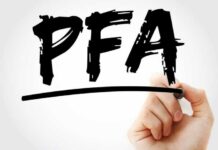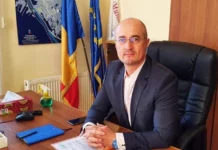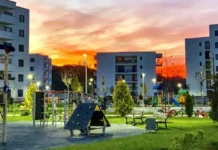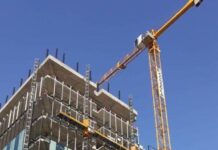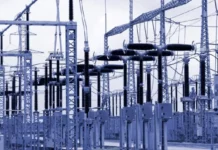Significant losses, overvalued assets, and lack of perspective lead the management of NEPI Romania to take steps to protect themselves.At the same time, small investors are left with no guarantee of a return on investments and no protection against losses. For the last five years, NEPI has recorded consecutive annual losses. It can only survive if the company is financed by the money of the shares – mainly of small investors (below 0.75%) who hold a very high percentage of the shares – 50.3% of the total and a value of 2,170,262,676 USD. But without the right to decide!
Reporter: Last time we talked about the recipe for success on “loss,” namely the case of the largest mall by the sea in Romania – City Mall Constanța, owned by the NEPI Rockcastle PLC group.
If we analyze this Group financially, what can you tell us, as a financial auditor?
Specialist: The NEPI Rockcastle PLC Group is registered offshore in the Isle of Man, dependent on the British Crown.
According to Bloomberg.com, the company has 205 registered employees, and the management includes:
- Alexandru Morar (CEO) – start in NEPI Group in 2007
- Mirela Covasa (CFO) – start in NEPI Group in 2011
- Andre van der Veer – start in NEPI Group in 2017
- Antoine L. Dijkstra – start in NEPI Group in 2017
- George E. Aase – start in NEPI Group in 2018
- Andreas Klingen – start in NEPI Group in 2020
If we refer to the board, the persons below are part of it:
- Alexandru Morar – start as a board member in 2018
- Mirela Covasa – – start as a board member in 2017
- Marek Pawel Noetzel – start as a board member in 2017
- Andre van der Veer – start as a board member in 2017
- Antoine L. Dijkstra – start as a board member in 2017
- George E. Aase – start as a board member in 2018
- Andreas Klingen – start as a board member in 2020
- Steven Brown – start as a board member in 2020
- Andries de Lange – start as a board member in 2020
| Board member | Position | Nr. of shares | % | Shares value (USD) | ||
| Alexandru Morar | CEO & Director | 459,007 | 0.075% | 3,253,836 | ||
| Mirela Covasa | CFO & Executive Director | 340,168 | 0.056% | 2,411,403 | ||
| Marek Pawel Noetzel | Executive Director | 239,146 | 0.039% | 1,695,273 | ||
| Andre van der Veer | Independent Non-Executive Director | 109,458 | 0.018% | 775,932 | ||
| Antoine L. Dijkstra | Independent Non-Executive Director | 4,693 | 0,0008% | 33,268 | ||
| George E. Aase | President of the Board | N/A | N/A | N/A | ||
| Andreas Klingen | Lead Independent Director | N/A | N/A | N/A | ||
| Steven Brown | Non- Independent Non-Executive Director | N/A | N/A | N/A | ||
| Andries de Lange | Non- Independent Non-Executive Director | N/A | N/A | N/A | ||
From the point of view of shareholders, the situation is as follows:
| Shareholders | Nr. of shares | % | Shares value (USD) |
| Fortress REIT Ltd. (Investment Management) | 132,517,291 | 21.8% | 939.396.419 |
| Public Investment Corporation (SOC) Ltd. | 63,518,168 | 10.4% | 450.272.059 |
| Resilient REIT Limited | 43,482,236 | 7.14% | 308.239.449 |
| The Vanguard Group, Inc. | 14,717,931 | 2.42% | 104.333.341 |
| Sanlam Investment Management (Pty) Ltd. | 10,996,102 | 1.81% | 77.949.819 |
| STANLIB Asset Management (Pty) Ltd. | 10,472,151 | 1.72% | 74.235.604 |
| BlackRock Fund Advisors | 10,305,828 | 1.69% | 73.056.564 |
| Satrix Managers (RF) Pty Ltd. | 6,248,919 | 1.03% | 44.297.707 |
| Ninety One UK Ltd. | 5,696,191 | 0.94% | 40.379.496 |
| Old Mutual Investment Group (Pty) Ltd. | 4,544,369 | 0.75% | 32.214.392 |
| Other small investors (individually below 0.75%) | 306.151.189 | 50.3% | 2.170.262.676 |
Among the changes on the Group’s board in 2020, NEPI announced the appointment of George Aase as chairman of the board, replacing Robert Emslie, who held the position from 2018 until last year.
Another notable change in 2020 is the “disappearance” of Desmond de Beer, former Barclays Bank Alumni and Managing Director for Resilient REIT Limited since 2002. Here, the connection with management becomes apparent as this company holds 3rd place in the top shareholders in the NEPI Rockcastle group. (see table above).
He has held the position of Non-Executive Director for NEPI since 2008.
The list continues with Sipho Majija, who was part of the board from 2018 until April 2020, when the trajectory was suddenly “interrupted.” Since 2017, he has also been part of the board of Fortress REIT Ltd, meaning that this is the individual shareholder with the most significant number of shares in the NEPI group.
With the arrival of the pandemic, essential changes took place on board.
If we look at the shareholding structure, it includes mainly real estate investment fund companies and other properties.
Quite “convenient” to have the help of investment funds in the countries where you work and the relationships of board members (former alumni of significant financial and management consulting companies around the world, bankers, or leaders of local real estate companies). However, in practice, not many have this “luck,” let’s say.
Also, the contribution of small investors (below 0.75%) is very high – 50.3% of the total shares and a value of 2,170,262,676 USD.
Of course, looking at the individual contribution of these investors, it is not a significant one. Still, when looking at the aggregated input, things change. It becomes a significant one, even bigger than the other ten shareholders presented above.
But decisions are made by the top 10 shareholders in the table above. They have the most significant number of shares and therefore “influence” the rest of the non-voting shareholders individually due to the insignificant percentage of shares.
Depending on the decisions issued, the influential shareholders may or may not leave in time to save themselves. Still, small investors do not receive the same courtesy. All they will be able to do is find themselves in possession of an overvalued management portfolio of shares. These shares would not sell even for the price of their initial investment, ending their shareholding with a negative result – loss.
A new entry at the executive management level is Andreas Klingen – JP Morgan & Erste Bank / Alumni, an executive member in over 11 CEE & CIS countries with relatively strong networking connections in these countries.
Reporter: If everything is going as well as we can see on the company’s website, why were these changes made both within the company and within the C (executive) level management?
Why did the management choose to leave right now if everything is going so well, as the CEO has publicly stated?
“Selling the office portfolio in 2020 was the best move. Now I would also invest in retail, even if many are afraid of malls. ”
The strongest Romanian executive in the European Real Estate market, Alexandru Morar, has led a portfolio of almost 6 billion euros consisting of malls, shopping centers, and logistics centers in Central and Eastern Europe, all from his headquarters in Bucharest. He says that he will invest in his projects while keeping the shares he owns in the company. If he were to invest, the whole retail segment would be on top of his list.
He has been CEO for six years, first for NEPI in 2015 and then for NEPI-Rockcastle. Now he has decided to retire to pursue personal projects. “I’ve missed having something of my own. I plan to stay in the company for a while. At the moment, I have a long list of ideas on what to do next, but I don’t have a detailed proposal yet. I certainly won’t be bored. I am not in talks with any other company. I haven’t even thought about it. And I don’t want to leave the country now. I won’t sell my shares in NEPI-Rockcastle, now is not a good time to sell “.
Specialist: NEPI Rockcastle, the largest retail developer in Central and Eastern Europe, announced that Alexandru Morar, CEO, and Mirela Covasa, CFO, have decided to leave the company and asked the board to prepare the succession plan.
At the same time, Alex Morar has been working for NEPI for 14 years, the last six in the CEO position. Mirela Covasa has been working for the company for ten years.
In the official statement, George Aase thanked the two for their work and achievements. NEPI has become the largest retail developer. The Group’s portfolio contains malls in Central and Eastern Europe, totaling 56 properties in 9 different countries and 2 million square meters. Contrasting this with its early days when the Group owned 22 properties in 3 countries, we notice a significant expansion under Alexandru Morar’s tutelage as CEO and Mirela Covasa as CFO.
Returning to your question, we can say that the team is clearing off, little by little. If we analyze their share transactions, we notice that the “bulk” of the shares was sold one year ago, the shareholders remaining have an overvalued equity.
Reporter: How is the NEPI Rockcastle group seen globally?
Specialist: NEPI Rockcastle is listed by Standard & Poor’s with a BBB rating (meaning stable outlook). They receive the same score from Fitch and Moody’s – the leading rating agencies in the world.
The total assets of NEPI reached 6.7 billion euros.
In Romania, NEPI owns, among others, the Promenada mall, Mega Mall, Brăila Mall, and City Park Constanţa, Iris Titan Shopping Centre Bucharest, Ploieşti Shopping City, Promenada Sibiu, Severin Shopping Centre, Shopping City Sibiu, Shopping City Timişoara.
Reporter: What results has the NEPI Group achieved so far?
Specialist: The NEPI Group, just like with the case analyzed last and whose portfolio contains City Mall Constanța, had cumulative losses in 2020, from investor’s money, of over 420 million RON and that is on the Romanian market only.
It is precisely the classic situation when the CEO / CFO buys overvalued shares/assets. They are filled with money, and suddenly there is a “need” for something personal. Small investors, who have nothing guaranteed, lose everything.
Reporter: So, the NEPI Group loses hundreds of millions of RON annually but continues to operate in Romania, where the state does not take any money.
Specialist: Yes, the NEPI group owns malls and retail spaces valued at 2 billion euros but avoids paying taxes to the Romanian state.
The Group does not make a profit and records losses of hundreds of millions of RON annually. Precisely what I was saying last time about the recipe for “loss” success – or rather, how to build a successful business being on loss.
The companies in the NEPI group pay almost no profit tax in Romania, despite the dozens of malls and commercial spaces they manage.
If the substantial losses incurred each year are not somehow covered, companies should go bankrupt. However, this is not the case with NEPI, which most likely found a source of financing through loans that do not need to be repaid and using the Group’s help. Such a scheme hides the capital transfer from Romania to other subsidiaries of the Group from abroad.
Reporter: Can you help us with the analysis of the figures for the NEPI Group?
Specialist: Yes, most companies in this maintenance group are managing malls and retail spaces.
According to the financial information of these companies, starting with 2015, the oldest data available to the public through the Ministry of Finance, the situation is as follows:
2015
Losses of 550 million in 2015 for the NEPI Rockcastle group of companies.
In 2015, only 36 of the 42 companies NEPI owns today were established, and 29 had only losses.
The revenues of all 36 companies were 800 million RON, but they recorded expenses of 1.35 billion RON.
Thus, losses amounted to 550 million lei, accumulated by all 29 companies. In comparison, the profit of the other seven companies was 20 million lei.
2016
In 2016, the losses amounted to 291 million.
2016 was also the year in which the number of companies in the NEPI portfolio reached 38.
How could these companies be established when most of the ones formed the previous year had only losses?
The level of expenditures was almost identical to those of the previous year, reaching 1.3 billion RON.
However, revenues were much higher, reaching 1.009 billion RON in 2016, and the cumulative loss of the company was 291 billion RON.
Of the 38 companies, only 8 made a profit, thus accumulating a loss of almost 10 million RON for each company. Although it seems to be half the previous year’s loss, the amount of 291 million RON remains a large one. The Group has not paid any taxes to the Romanian state this year either.
2017
The year 2017 brought an increase in the expenses of the NEPI group, of up to 1.4 million RON. However, revenues also increased to 1.13 billion RON.
The 29 companies that registered debts accumulated a loss of 270 million, with an average of 5.5 million RON loss for each company.
The profit of the films that did not incur a loss was 50 million RON, a decrease of over 21 million RON compared to the previous year.
2018
In 2018, the number of companies in the NEPI group reached 40. Cumulative expenses decreased compared to 2017 but did not exceed 1.31 billion RON.
At the same time, the losses also decreased in 2018, reaching 190 million RON, almost 80 million less compared to the previous year.
For each company, the amount of annual loss is 3.7 million. 16 of the 40 companies registered a profit in 2018, its cumulative value being 53 million RON.
2019
In 2019, the number of companies in the NEPI group reached 42. The total expenses were over 1.5 billion RON, the losses increasing up to 292 million RON.
2020
In 2020, the NEPI group recorded over 1.53 billion RON expenses, with losses of 421 million RON.
However, although 2020 was a strong year marked by the COVID-19 pandemic, nine NEPI companies registered a profit of 45 million RON with an annual net average of 5 million RON for each company.
It is almost double the profit of 2019 when the profit registered was 36 million RON, obtained despite the restrictions and measures imposed by the pandemic.
The revenue trend of NEPI Romania companies in 2015-2020 increases from 800 million RON in 2015 to 1.009 billion in 2016, 1.13 billion RON in 2017, and 1, 12 billion RON in 2018 1,208 billion RON in 2019. (see table below) In 2020, revenues were at the level of 2018, with 1,11 billion RON, despite the crisis imposed by the COVID-19 pandemic.
| Year | Total income | Total income (%) | Comment total income | Total spending |
| 2015 | 800.000.000 | N/A | N/A | 1.350.000.000 |
| 2016 | 1.009.000.000 | 26,13% | Revenue growth | 1.300.000.000 |
| 2017 | 1.130.000.000 | 11,99% | Revenue growth | 1.400.000.000 |
| 2018 | 1.120.000.000 | -0,88% | Revenue growth | 1.310.000.000 |
| 2019 | 1.208.000.000 | 7,86% | Revenue growth | 1.500.000.000 |
| 2020 | 1.110.000.000 | -8,11% | Revenue growth | 1.531.000.000 |
| Year | Result | Monetary Result (in RON) | Monetary Result (%) | Comment Result |
| 2015 | Loss | (550.000.000) | N/A | N/A |
| 2016 | Loss | (291.000.000) | -47% | Loss reduction |
| 2017 | Loss | (270.000.000) | -7% | Loss reduction |
| 2018 | Loss | (190.000.000) | -30% | Loss reduction |
| 2019 | Loss | (292.000.000) | 54% | Increase in loss |
| 2020 | Loss | (421.000.000) | 44% | Increase in loss |
| Year | No. of companies | No. of companies (%) | Comment Nr. of companies |
| 2015 | 36 | N/A | N/A |
| 2016 | 38 | 6% | increase nr. |
| 2017 | 38 | 0% | same nr. |
| 2018 | 40 | 5% | increase nr. |
| 2019 | 42 | 5% | increase nr. |
| 2020 | 42 | 0% | same nr. |
As explained in the previous article, compared to companies that have an upward slope in turnover but “mark” losses each year, I can highlight the following:
Such companies with consecutive annual losses have no way to survive unless they are funded. And they can be financed in two ways: either by bank loans or by loans from the parent company / the other companies in the Group.
Reporter: Basically, where does the company’s money go?
Specialist: Many times, in my experience, the money goes to contracts with third parties for services.
It is essential that the nature of these services is accurate and describes a purpose of a business covered by another contract.
The companies in the NEPI group record very high expenses with third parties.
In the data made public by the Ministry of Finance, the expenses are not specified and detailed. Still, there is a practice among several foreign companies that these third parties are companies from the same Group who supply products and services for very high prices.
It is a question of capital transfer, no longer paying taxes to the state, this being the interest of such companies.
Reporter: Can’t state institutions do something in these cases to neutralize these actions?
Specialist: No, ANAF has nothing to do with such a company, according to the legislation in force, unless it is a fictitious contract in the middle, which is identified and determined by the competent institutions in this case.
Only if it is found that the contracted services or products are not delivered can something be done.
If it is not a fictitious contract, it is very complicated for ANAF to justify making accusations when a company has good contracts, even if it purchases at very high prices.
Reporter: In 2021, the NEPI group will borrow money to finance some environmental projects. What do you think about this?
Specialist: Yes, in 2021, NEPI Rockcastle will borrow 73 million EUR from the International Financial Corporation (IFC) to finance environmental projects in Romania.
IFC, a member of the World Bank Group, has lent 73.5 million EUR to NE Property BV. This company is a wholly-owned subsidiary of NEPI Rockcastle, the largest mall owner in the Central and Eastern European region. The purpose of this loan is to contribute to the construction of solid business infrastructure for environmental projects in Romania, subsequently attracting economic growth of low carbon activities.
$ 2 Billion Real Sector Crisis Response Facility is funding the loan as part of the $ 8 billion larger IFC facility (Fast-Track Financing Facility) supporting private companies affected by the economic problems caused by COVID-19.
“NEPI Rockcastle continues to focus on investing in clean and sustainable business. This “green” loan comes to reconfirm our commitment to promoting sustainable practices by allocating funds on eligible green projects carried out in Romania. This is defined in our Green Financing Framework, ” says Mirela Covaşă, CFO NEPI Rockcastle.
Given NEPI Rockcastle’s sustainability goals and goal of becoming carbon neutral by 2030, the loan will be used to fund those projects that meet the eligibility criteria of the Green Funding Framework, according to the 2018 Green Bond Principles and the 2020 Green Loan Principles.
Reporter: So, upfront, we have CSR activities, and behind the scenes, there is an opportunity for cash inflow, as Ary Naïm, CEE Regional Director at IFC, says:
“Against the backdrop of the COVID-19 pandemic, IFC funding is coming at an opportune time and will give NEPI Rockcastle access to long-term liquidity. This will help the business overcome the crisis and the ongoing uncertainties of these challenging times.” Says Ary Naïm, CEE Regional Director at IFC.
Specialist: Indeed, this cash inflow is very welcome in a sector severely affected by the economic crisis. Not to mention the context of colossal losses coming from behind and under the umbrella of a social action that could positively contribute to sales. It sounds like a perfect solution.
The investment portfolio that IFC has committed in Romania until June 2021 amounts to $1.03 billion invested in 29 projects.
NEPI Rockcastle is the largest retail real estate company in the Central and Eastern European region. The Group owns and operates 54 retail properties (excluding joint ventures) in Romania, Poland, Slovakia, Bulgaria, Hungary, the Czech Republic, Croatia, Serbia, and Lithuania.
Reporter: If the future looks so bright, why was the portfolio sold in 2020?
Specialist: The decision to sell the office portfolio to AFI Europe in a transaction of over 300 million EUR was a good one, so the company had cash at a time when liquidity was necessary, and in addition to that, this action stopped the assets of the company from being even more devaluated.
Reporter: Who is NEPI Rockcastle if we look at the Stock Exchange?
Specialist: If we look at the stock market in South Africa and Europe, where the NEPI group is listed, we identify the following:
♦ NEPI Rockcastle has a capitalization of 2.5 billion euros
The South Africans from NEPI Rockcastle, the largest owner of shopping centers in Romania, which also owns the Mega Mall and the Promenade in Bucharest but also the new Promenade Sibiu, have successfully concluded a green bond issue of 500 million euros for seven years, with a fixed interest rate of 3.375% per year.
The funds will be used to refinance the sustainable building portfolio and fund NEPI Rockcastle Group’s energy efficiency projects. “In a context of uncertainty generated by the COVID-19 pandemic, the issuance of green bonds has generated considerable interest from investors in Europe. The offer was oversubscribed twice. The subscription register was reaching over 1.1 billion euros “, ING Bank, a credit institution part of the brokerage consortium in the first issue of green bonds issued by NEPI Rockcastle, transmitted yesterday. The company has a 2.7 billion euros capitalization.
♦ NEPI Rockcastle, the largest mall owner in Romania, has a 57.3% collapse on the Amsterdam Stock Exchange at the beginning of 2020.
The Group received 160 million euros in rents in H1 / 2020, 20% less than in H1 / 2019.
The shares of the South African investment fund are traded on the Amsterdam Stock Exchange down 57.3% since the beginning of the year, the issuer reaching EUR 2.9 billion in capitalization, according to Investing.com in 2020.
♦ The real estate investment group is also traded on the Johannesburg Stock Exchange, the largest city in South Africa. Its shares fell in 2020 by 43.5%, reaching a market value of 42.4 billion South African ranks. IE, EUR 2.2 million.
Thus, a lot of money moves at dizzying speed through the accounts of the NEPI group, but they do not touch Romania.







